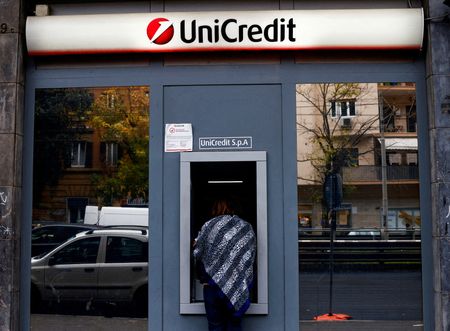By Johann M Cherian and Shristi Achar A
(Reuters) -UK’s blue-chip FTSE 100 edged higher on Tuesday, as rising shares of oil and mining majors helped shake off early weakness following a surprise monetary policy tweak by Bank of Japan (BoJ).
The blue-chip FTSE 100 closed 0.1% higher, further distancing itself from one-month lows hit last week.
The energy and industrial metals index climbed 0.7% and 1.1%, respectively, as a softer dollar boosted prices of commodities from oil to copper. [O/R] [MET/L]
Hurting the global sentiment, the BoJ widened long-term yield controls that allow long-term interest rates to rise more, becoming the latest central bank to join the global monetary policy tightening camp.
Government bond yields rose across the board, keeping equity markets under pressure.
“Bond yields have still spiked higher as investors look to price in further tightening next year, however the initial knee jerk reaction (to BoJ) has been tempered by the fact that this was likely to happen in the New Year anyway,” said Michael Hewson, chief market analyst at CMC Markets UK.
“Firmer commodity prices are helping to lift basic resource stocks.”
The FTSE 100 has remained resilient this year in the face of growing inflationary pressures and concerns of a recession, as surging commodities and weaker sterling boosted the internatinally focussed index, down just 0.1% year-to-date.
“The UK market is well placed because it is generally a market with a lower valuation, getting more earnings per share. And, we’re moving into a decade where fiscal policy will be very important,” said Emma Mogford, fund manager at Premier Miton Monthly Income Fund.
“Markets are likely to prefer companies which have profits today and tomorrow, rather than the promise of profits far in the future.”
However, the domestically exposed FTSE 250 index dropped 0.6% to hit a six-week closing low.
Among single stocks, Petrofac Ltd lost 3.2% after plunging as much as 10% during the day after the oilfield services provider warned that it said it could post an operating loss for the year.
Sage Group slid 2.8% after UBS downgraded the software company to “sell” from “neutral”.
(Reporting by Johann M Cherian and Shristi Achar A in Bengaluru; Editing by Maju Samuel and Krishna Chandra Eluri)











